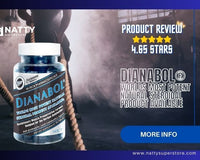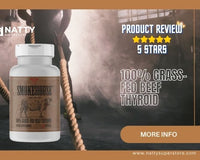Tryptophan is an essential amino acid, meaning that our bodies cannot synthesize it; it must be obtained from our diet. It plays several critical roles in bodily functions, particularly in the synthesis of proteins and as a precursor to several important biomolecules, including the neurotransmitter serotonin, the hormone melatonin, and the vitamin niacin (vitamin B3). Understanding tryptophan's various benefits necessitates a look into its functions within the body and how it can influence both physical and mental health. [1]
Tryptophan as a Precursor to Serotonin
One of the most well-known roles of tryptophan is its involvement in the production of serotonin, often referred to as the "feel-good" neurotransmitter. Serotonin is integral to mood regulation, and its imbalance has been associated with mood disorders such as depression and anxiety.
By serving as a building block for serotonin, tryptophan intake is directly linked to the body’s ability to produce this neurotransmitter. Therefore, diets sufficient in tryptophan can support positive mood states and have been implicated in the treatment of depression and anxiety, with some research suggesting that tryptophan supplementation may enhance the effectiveness of certain antidepressants. [2]
Sleep and Circadian Rhythms
Through its conversion into serotonin, tryptophan also indirectly contributes to the synthesis of melatonin, a hormone that regulates sleep-wake cycles. Melatonin production is influenced by light exposure and time of day, peaking at night to promote sleep and decreasing with daylight. By supporting the body's natural production of melatonin, tryptophan can help regulate sleep patterns, which is why tryptophan-rich foods are often suggested as dietary strategies for improving sleep quality. [3]
Niacin Synthesis and Energy Metabolism
Tryptophan is also a dietary precursor for niacin, an essential vitamin that plays a key role in energy metabolism, DNA repair, and the production of various hormones. Niacin deficiency can lead to pellagra, a disease characterized by dermatitis, diarrhea, dementia, and eventually death if untreated. While niacin is found in many foods, the body's ability to convert tryptophan to niacin provides an additional safeguard against this deficiency, provided that dietary tryptophan intake is adequate. [4]
Gut Health and Immunity
Emerging research indicates that tryptophan and its metabolites can influence gut health and immunity. The gut microbiota can metabolize tryptophan into compounds that affect the gut lining's integrity and immune response. Moreover, tryptophan metabolites are known to play roles in the modulation of the immune system, which can impact inflammatory processes and potentially the susceptibility to autoimmune diseases. [5]
Pain Modulation and Physical Performance
Tryptophan is involved in pain modulation due to its role in serotonin synthesis. Serotonin can affect pain perception, and tryptophan availability has been studied in relation to pain disorders.
Furthermore, because tryptophan competes with other amino acids for transport across the blood-brain barrier, its ratio in the bloodstream can affect how much is used for serotonin production. Some evidence suggests that manipulating tryptophan levels might be beneficial in enhancing endurance performance and reducing fatigue by altering brain serotonin levels, though this is an area of ongoing research. [6]
Sources of Tryptophan and Dietary Considerations
Tryptophan can be found in a variety of foods, including meats like turkey and chicken, fish, dairy products, nuts, seeds, tofu, and some legumes. While many people associate turkey with tryptophan because of the commonly reported feeling of sleepiness after a big Thanksgiving meal, the reality is that tryptophan is present in similar quantities in other protein-containing foods. The sleepiness is more likely due to the overall large intake of carbohydrates and calories. [7]
How much Tryptophan do you need a day?
Tryptophan is an essential amino acid that the body cannot synthesize on its own; therefore, it must be obtained through diet. It's a precursor to serotonin, a neurotransmitter that regulates mood, sleep, and appetite. The recommended daily intake of tryptophan varies based on several factors, including age, sex, and overall health. For adults, the suggested daily amount is around 250 to 425 milligrams, according to the Institute of Medicine's Dietary Reference Intakes.
This requirement is typically met through a balanced diet. Foods rich in tryptophan include turkey, chicken, milk, cheese, yogurt, eggs, fish, and various nuts and seeds. For vegetarians or those on a plant-based diet, soy products, such as tofu and soybeans, are excellent sources.
While deficiencies are rare, low levels of tryptophan can lead to mood disorders and sleep disturbances. It's important to consult with a healthcare provider before considering supplementation, as excess tryptophan can lead to adverse effects and interact with certain medications. [8]
Supplementation and Safety
Products that contain Tryptophan:
Ninja Zen - Recovery Sleep Aid
Tryptophan is available as a dietary supplement, often in the form of L-tryptophan or 5-HTP (5-hydroxytryptophan), a metabolite of tryptophan that is one step closer to serotonin synthesis. These supplements are sometimes used to aid sleep, improve mood, or help manage pain.
However, while tryptophan supplements can be beneficial, they must be used with caution. Excessive intake of tryptophan can lead to a condition called serotonin syndrome, a potentially life-threatening state of serotonin excess. Therefore, it is crucial to use tryptophan supplements under the guidance of a healthcare provider.
Tryptophan is an essential amino acid with a host of benefits that stem from its role in protein synthesis and as a precursor to serotonin, melatonin, and niacin. Its influence on mood regulation, sleep quality, energy metabolism, gut health, immunity, and pain perception highlights its importance in the diet. Ensuring adequate intake of tryptophan through food is generally sufficient for most individuals, with supplementation being an option under certain circumstances and with medical oversight.









